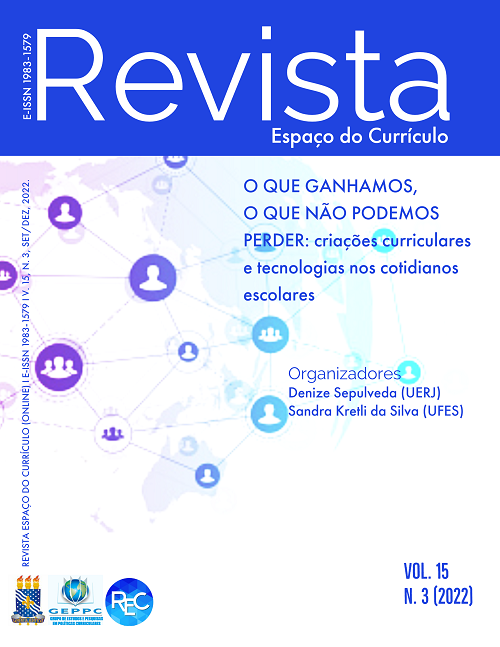SOCIAL CURRICULUM CONSTRUCTION
what students do
DOI:
https://doi.org/10.15687/rec.v15i3.64673Keywords:
Curriculum, Pandemic, Transformative EducationAbstract
This article deals with the curricular constructions that emerged during the Covid 19 pandemic and that should be resumed in return to face-to-face academic activities. It presents a case developed in a Brazilian higher education institution involving several actors in search of answers to real challenges faced by public institutions. It takes a qualitative approach, through a case study with data production involving various documentary and narrative sources. It is theoretically based on Dewey (1979) Sacristán (1998), Peres-Gomes (1998) and Freire (1997). The analysis presented seeks, at the same time, to explore the possibilities of building a curriculum in action strongly committed to the diagnosis and search for solutions to real community problems and the practice of academic research also committed to political and social dimensions. It is concluded that educational institutions faced the challenges of, without losing their commitment to the production of knowledge, overcoming the pandemic with their best instruments: wisdom and social cohesion are an attribute of their curriculum in action, participatory and alive.
Downloads
Metrics
References
ALMEIDA, Fernando José de; SILVA, Maria da Graça Moreira da. Currículo como direito e a cultura digital. Revista e-Curriculum, São Paulo, n.12v.02maio/out. 2014.
AMARAL, Maria Nazaré de Camargo Pacheco. Dewey: Filosofia e Experiência Democrática. 1ª edição. São Paulo: Ed. Perspectiva. 2007.
ANDERSON, Lori; KRATHWOHI, David. A taxonomy for Learning, Teaching and Assessing: a revision of Bloom’s taxonomy of educational objectives. New YporL: Addison Wesley Longman, 2001.
Dewey, John. Democracia e Educação. 4. Edição. São Paulo: Companhia Editora Nacional. 1979.
FUNDAÇÃO GETULIO VARGAS. Escola de Políticas Públicas e Governo– FGV-EPPG. Estrutura do curso de graduação em administração pública da FGV EPPG. Disponível em: https://eppg.fgv.br/curso/graduacao/graduacao-em-administracao-publica#estrutura. Acesso em: 20 out. 2022.
FUNDAÇÃO GETULIO VARGAS. Escola de Políticas Públicas e Governo. Projeto Pedagógico do Curso. 2021a. Disponível em repositório institucional. Acesso em: 20 out. 2021.
FUNDAÇÃO GETULIO VARGAS. Escola de Políticas Públicas e Governo. Plano de Ensino e Aprendizagem DEPPG-I. Disponível em repositório institucional. Acesso em: 20 out. 2021b.
FUNDAÇÃO GETULIO VARGAS. Portal. Disponível em: https://portal.fgv.br/noticias/desafios-estrategicos-politicas-publicas-e-governanca-sao-discutidos-alem-sala-aula. Acesso em: 20 out. 2022.
FREIRE, Paulo. A Pedagogia do Oprimido. 17. ed. Rio de Janeiro: Paz e Terra. 1987.
GOODSON, Ivor F. Currículo: Teoria e História. Trad. Attílio Brunetta. 13. ed. São Paulo: Editora Vozes. 2012.
LEMOS, André. Cibercultura: Tecnologia e vida social na cultura contemporânea. 8.ed. Porto Alegre: Editora Sulina. 2015.
MINISTÉRIO DA EDUCAÇÃO. DCN-AP. Diretrizes Curriculares Nacionais do curso de graduação em Administração Pública. Disponível em: http://portal.mec.gov.br/index.php?option=com_docman&view=download&alias=14957-rces001-14&category_slug=janeiro-2014-pdf&Itemid=30192. Acesso em: 25 out. 2022.
OCDE (2022), Educacion at a Glance. Les indicateurs de l'OCDE,, OECD Publishing, Paris. Disponível em: https://www.oecd-ilibrary.org/education/education-at-a-glance_19991487. Acesso em: 25 de out. de 22.
PAPERT, Seymour. Eight Big Ideas Behind the Constructionist Learning Lab. Unpublished internal document. South Portland, Maine. (1999). Disponível em: http://stager.org/articles/8bigideas.pdf. Acesso em: 25 out. 2022.
PÉREZ GÓMEZ, Angel I. Ensino para a compreensão. In: SACRISTÁN, J. Gimeno e GÓMEZ, A. I. Pérez. Compreender e Transformar o Ensino. 4. ed. Porto Alegre: Artmed, 1998, p. 67-98.
RUPP, Lucila Lerro. A produção audiovisual e o acesso ao não dito: diálogos entre a narrativa de vídeos produzidos por estudantes e suas narrativas orais e textuais. Orientador: Fernando José de Almeida. 2022. 225 p. Tese de doutorado. Em Educação: Currículo. PUC-SP.
SACRISTÁN, José Gimeno. Plano do currículo, plano do ensino: o papel dos professores/as. In: SACRISTÁN, J. Gimeno e GÓMEZ, A. I. Pérez. Compreender e Transformar o Ensino. 4. ed. Porto Alegre: Artmed, 1998, p. 197-232
SCRUM.ORG. O que é Scrum? Uma melhor maneira de construir produtos Disponível em: https://www.scrum.org/resources/what-is-scrum . Acesso em: 18/10/2022.
SOSTER, Tatiana. Revelando as essências da educação maker: percepções das teorias e das práticas. 2018. 175 f. Tese (Doutorado em Educação: Currículo) - Programa de Estudos Pós-Graduados em Educação: Currículo, Pontifícia Universidade Católica de São Paulo, São Paulo, 2018.
SOSTER; Tatiana; FUHRMANN, Tamar; CAMPOS, Fabio. Mapping Assessment Practices in School Makerspaces. In: FABLEAN ASIA 2020 - Constructive Diversity: Role of maker education in building diverse learning environment across cultures. Bangkok, Thailand. Proceedings […]. Suksapattana Foundation, 2020. p. 25-29.
WOLFF, Carolina Gil. Ensino remoto e pandemia: urgências e expressões curriculares da cultura digital. Orientador: Fernando José de Almeida. 2020. 125p. Dissertação de mestrado, em Educação: Currículo da PUC-SP.
Downloads
Published
How to Cite
Issue
Section
License
Copyright (c) 2022 Curriculum Space Journal

This work is licensed under a Creative Commons Attribution 4.0 International License.
By submitting an article to Curriculum Space Journal (CSJ) and having it approved, the authors agree to assign, without remuneration, the following rights to Curriculum Space Journal: first publication rights and permission for CSJ to redistribute this article. article and its metadata to the indexing and reference services that its editors deem appropriate.
















